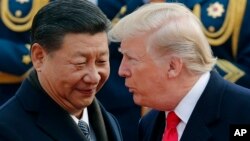President Donald Trump has acted to address Chinese policies and practices that are harming American innovation.
The President announced that the United States will consider adding 25 percent additional tariffs on certain products that are supported by Chinese industrial policies that unfairly disadvantage U.S. companies, including aerospace, information communication technology, and machinery.
In addition, the US Trade Representative will confront China’s discriminatory technology licensing practices through a World Trade Organization dispute proceeding.
And the Department of Treasury will propose restrictions on investment by China in sensitive U.S. technology sectors.
These proposed steps are the result of an investigation into Chinese policies and practices related to technology transfer, intellectual property, and innovation.
The U.S. Trade Representative, or USTR, led the investigation under Section 301 of the Trade Act of 1974, which gives the USTR authority subject to Presidential direction to address unfair trade practices that burden U.S. commerce.
This was the first such investigation since 2013. It concluded that China uses foreign ownership restrictions, such as joint venture requirements and administrative review and licensing processes to force or pressure U.S. companies to transfer technology to Chinese entities.
China requires foreign companies that seek to access their New Energy Vehicles market to transfer core technologies and disclose development and manufacturing technology for the entire vehicle.
The investigation concluded that China often forces U.S. companies seeking to license technologies to Chinese entities to do so on non-market based terms.
China imposes contractual restrictions on the licensing of intellectual property and foreign technology into their country, but does not put the same restrictions on contracts between two Chinese enterprises.
China directs and unfairly facilitates investments and acquisitions to generate large-scale technology transfer from U.S. companies to Chinese entities.
The investigation further concluded that China conducts and supports cyber intrusions into U.S. companies to access commercial secrets. In 2014, the United States charged five Chinese military hackers for cyber espionage committed against U.S. corporations and a labor organization for commercial advantage.
It is estimated that China’s unfair acts, policies, and practices cause tens of billions in damages to the United States each year.
“The theft of American prosperity will end,” said the President.“We’re going to defend our industry and create a level playing field for the American worker.”














